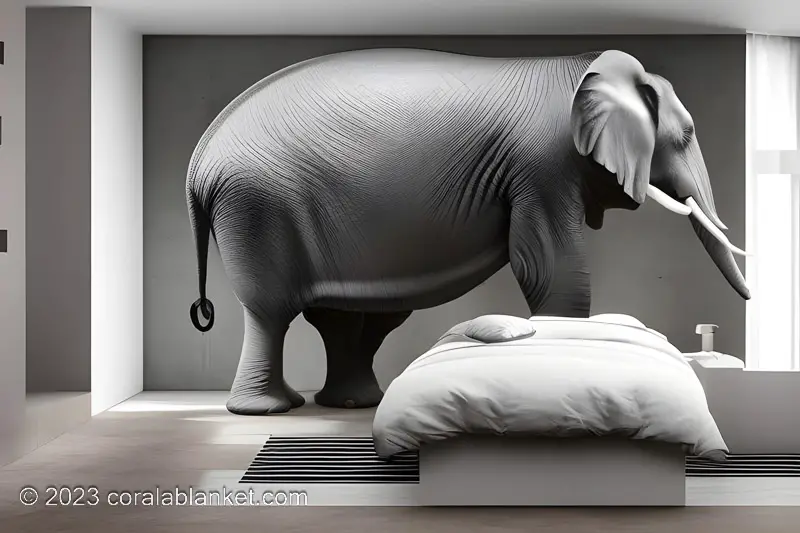Table of Contents
Can You Suffocate Under a Blanket?
We’ve all been there. You’re trying to sleep, but you just can’t get comfortable. So you reach for the nearest blanket and pull it over your head in hopes of blocking out the light and finally getting some rest.
But is this really a safe way to sleep?
Let’s take a closer look.
Table of Contents
Can you suffocate under a blanket?
The answer is no, it is not possible to suffocate under a blanket. This can be demonstrated by the fact that air can still pass through the blanket and that in cases where people have experienced difficulty breathing, they have been able to recover and are still alive to tell the tale.
Furthermore, due to the body’s natural instinct to survive, it would most likely struggle and kick the blanket off before it reached a point of suffocation. As a result, the most likely outcome of sleeping with a blanket over the head is simply waking up with difficulty breathing, as opposed to actual suffocation.
Why is it hard to breathe under a blanket?
It is hard to breathe under a blanket because when there is restricted airflow due to the thickness of the blanket, a slow but steady build-up of carbon dioxide can occur which can lead to a lack of oxygen.
Even if the blanket is thin and has enough oxygen, a hot and stuffy bed may eventually become unbearably uncomfortable and wake a person up.

Furthermore, when we sleep with a blanket, we create a “microclimate” around our skin that traps heat and causes the body to lose its ability to regulate its temperature. This can make it difficult to breathe.
All of these factors can contribute to making it hard to breathe under a blanket.
Sleeping with blanket over head
Is it safe to sleep with a blanket over your head? Although it may sound comfortable and innocent, this habit can actually bring forth risks that could put your safety at risk. In emergency situations such as fires, break-ins, and other scenarios, sleeping with a blanket over your head can reduce your awareness of the situation and subsequently put your life in danger.
Sleeping with a weighted blanket over head
It’s a common question: Is it safe to sleep with a weighted blanket over your head? Sleeping with the blanket over head is especially popular among autistic persons as it gives security and comfort.
Our bodies naturally cool down before and during sleep, which is why we need a blanket for warmth. A weighted blanket can provide extra warmth and comfort, but it should never be placed over the head.
Weighted blankets are designed to be evenly distributed throughout the fabric so that one area is not too heavy and cause potential discomfort. This means that they should be placed only over the body, not over the head.

Can you suffocate under a weighted blanket?
Sleeping with a weighted blanket over the head can be dangerous as it heavily restricts breathing and increases the risk of suffocation. See more pros and cons of weighted blakets.
Why do people ask if you can suffocate under a blanket?
While there is no scientific evidence that suffocation can occur while sleeping under a blanket, people with underlying conditions such as asthma, sleep apnea, or cardiac disease may be at higher risk.
Sleep apnea is a sleep disorder in which a person’s breathing is interrupted during sleep due to shallow or paused breathing. It can lead to problems such as fatigue, insomnia, depression, high blood pressure, and heart problems.
People who suffer from sleep apnea are at a higher risk of suffocation when they cover their head while sleeping because the covering restricts airflow and causes them to rebreathe the same air they exhaled. This leads to a lack of oxygen in the body over time, which is why it is important to ensure that proper airflow is maintained while sleeping under a blanket.
Dangers of Sleeping with a Blanket over the Head.
1. Risk of Sudden Infant Death Syndrome
The risk of sudden infant death syndrome (SIDS) when sleeping with a blanket over the head is significantly increased. According to a study funded by the NIH, infants up to one year of age who are introduced to a blanket in their sleep space have an increased risk of accidental suffocation, SIDS, and other sleep-related injuries or deaths.
Parents should never put a blanket over a baby’s head while they are sleeping, and should always ensure that their infants are in a safe sleeping environment free of soft items like pillows and blankets.
2. Increased Chance of Temperature Regulation Problems
Sleeping with a blanket over the head increases the chance of temperature regulation problems because the air circulation is impaired. This means that the body cannot regulate its temperature as easily and may become too hot or too cold.
- If a person gets too hot, they may wake up in the middle of the night sweating and feeling uncomfortable.
- If a person gets too cold, they may not get enough oxygen to sleep soundly, leading to wakefulness.
Additionally, the movement of air under the blanket can cause the bed to become stuffy and unbearably uncomfortable, which can also lead to waking up in the middle of the night.

3. Increased Risk of Overheating
Additionally, sleeping under a blanket can cause an increase in body temperature, which can also lead to an uncomfortable sleep. It is therefore important to ensure that you have adequate ventilation while sleeping under a blanket to ensure that your body gets enough oxygen and that your sleep is comfortable.
4. Risk of Facial Obstruction – Suffocation
The risk of facial obstruction when sleeping with a blanket over the head is suffocation, as it can cause a shortage of oxygen in the body. This is especially dangerous for those with underlying conditions such as asthma, sleep apnea, or cardiac disease, as they can experience even more difficulty breathing.
This can also be a hazard for young children as they lack control over their bodies and may not be able to move out of the dangerous situation quickly enough.
5. Risk of using a too heavy weighted blanket
The risks of using a too heavy weighted blanket can include difficulty breathing, increased discomfort during sleep, increased anxiety, increased heart rate, and an increased risk of suffocation. Too heavy of a blanket can feel overwhelming and oppressive, making it difficult to relax and get comfortable.

FAQ
Is it safe to sleep with a blanket over your head?
When it comes to sleeping under a blanket, the general consensus is that it is safe but unhealthy. Thick and non-breathable blankets can restrict the airflow and lead to a lack of oxygen. Even when using a light sheet in lieu of a thick blanket, it is still not recommended to have a blanket over the head while sleeping due to risks of emergency scenarios such as fires, break-ins, and other unfortunate occurrences.
As it is difficult for some to adjust to sleeping without a blanket, alternatives such as wearable blankets are recommended.
What are the risks associated with sleeping under a blanket?
The risks associated with sleeping under a blanket include: fear of suffocation, lack of oxygen, unawareness of strange sounds and smells. Additionally, sleeping in an old or dirty blanket can increase the risk of exposure to allergens and dust mites.
How can I ensure I get enough oxygen when sleeping with a blanket over my head?
If you want to ensure that you get enough oxygen when sleeping with a blanket over your head, there are a few steps you can take to help ensure your safety.
- Make sure your blanket is breathable. The thicker the blanket is, the less airflow it will allow. If the blanket is not breathable, it can lead to a slow build-up of carbon dioxide.
- Do not sleep with a thick blanket covering your head. This could create an airtight space, which would restrict the airflow
- Make sure the head is not completely covered. It is best to leave an opening over the mouth or nose to make sure air is still flowing.
Is it safe for children to sleep with a blanket?
The American Academy of Pediatrics (AAP) recommends that kids under the age of 1 do not sleep with loose blankets above or below them. After the age of 1, it is up to the parents to decide if their child is ready for a blanket.
Can you suffocate in your sleep from pillow?
Can you suffocate in your sleep from a pillow? It seems highly unlikely, as the air can still pass through a pillow, and you would likely panic if enough CO2 was accumulating in your lungs. It is possible to experience difficulty in breathing due to thickness of the blankets, like what happened to a user when they fell asleep with a thick leather coat over their head, but it is still unlikely that you will suffocate from a pillow.
Can you suffocate in a sleeping bag?
I’ve always been curious about this. It seems unlikely, as you can probably breathe through your sleeping bag, and unless you make an airtight seal, the air will be able to escape and enter at a reasonable rate.
Additionally, I assume that your body would start to panic if you were exposed to too much carbon dioxide, which is another danger of suffocating in your sleep.
Can weighted blankets cause circulation problems?
Because the extra pressure and weight can also restrict circulation, there is some concern that it could lead to circulation problems such as numbness, tingling, and even blood clots.
So, can weighted blankets cause circulation problems? The answer is that it depends on the person. For some people, a weighted blanket may cause some temporary discomfort, such as numbness or tingling. However, for most people, the risks are likely minimal.
Use the Corala Weighted Blanket Calculator to find the ideal weight of your weighted blanket.
That said, it’s still important to take precautions when using a weighted blanket. Those with existing circulation issues, such as diabetes or peripheral artery disease, should speak with a doctor before using a weighted blanket. Additionally, it’s important to not use the blanket for more than 15-20 minutes at a time, and to ensure that the blanket is not too heavy or too tight.
- 10 Dreamy Victorian-Inspired Bedroom & Sleepwear Sets - May 13, 2025
- 10 Best Cottagecore Bedroom Sets With Matching Sleepwear - May 13, 2025
- Why Leopard Print Makes Perfect Sleep-To-Style Moments - May 13, 2025

